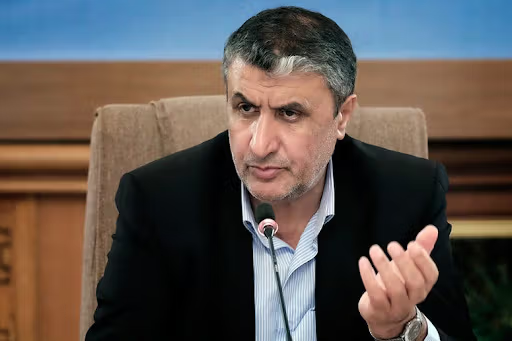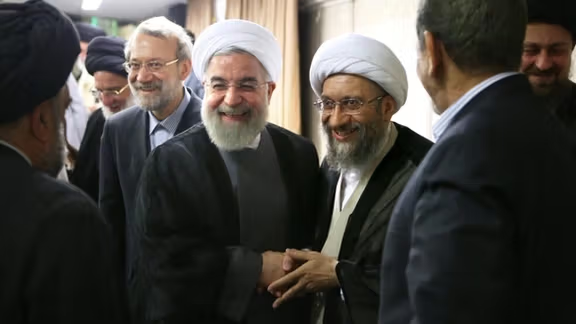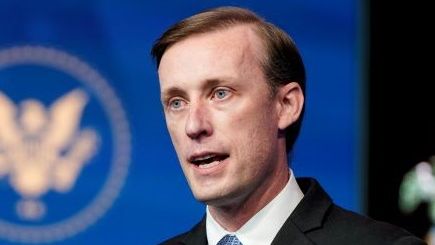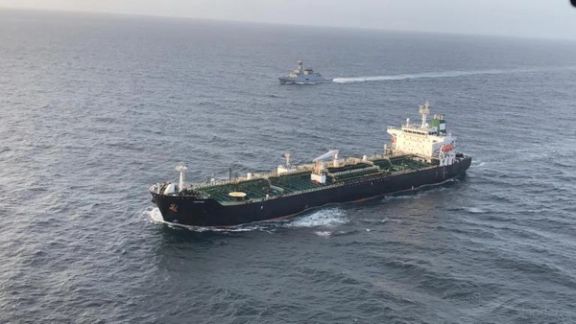Iran Nuclear Chief Reports Agreement With Russia Over Outstanding Debts

Iran nuclear chief says he has agreed with Russia to pay a 500-million euro debt in installments to keep civilian nuclear reactor projects going.

Iran nuclear chief says he has agreed with Russia to pay a 500-million euro debt in installments to keep civilian nuclear reactor projects going.
Mohammad Eslami, vice president and head of Iran’s atomic energy agency visiting Russia has said on Wednesday that he has reached an agreement about gradual payment of Tehran’s debts to Moscow.
Iran had previously said that it owes 500 million euros for services Russia rendered to maintain the Bushehr nuclear power reactor. Russia built the reactor and continues to assist Iran in maintaining its operation.
The official government news website IRNA quoted Eslami as saying that he met with Alexey Likhachev, Director General of Russia’s Rosatomand negotiated an agreement for installment payments to clear its debt, which has gone unpaid for 22 months. Eslami expressed hope that with this agreement current projects can proceed without major disruptions.
Iran is expanding the Bushehr reactor by planning to add phase two and three reactors to generate more electricity. The country suffers from a chronic shortage of electrical power, with daily outages that cripple industry and anger home consumers.
The Bushehr reactor is not part of the current nuclear dispute between the West and Iran, as Russia handles the nuclear fuel cycle. Iran has been enriching uranium at other facilities and stockpiling more purified fissile material that has alarmed the United States and its European allies.

Many in Iran ask if former president Hassan Rouhani and parliament speaker Ali Larijani have been pushed out of the ruling circle for good by hardliners.
Iranian reformist politicians have been wondering about the political future of former President Hassan Rouhani and former Majles (parliament) Speaker Ali Larijani as they have been absent from the political scene after the Raisi administration took over in August.
Rouhani has been last seen at Raisi's inauguration at the Iranian parliament in early August and Larijani was seen last week after a long absence at a commemoration ceremony for a top Shiite cleric in his hometown, Amol.
It is not just a matter of their political futures. Some have also been asking about Rouhani's whereabouts. Anecdotal accounts say he was summoned to court in mid-September for an investigation, while other rumors indicate that he has been visiting Austria to see her daughter. None of the reports have been verified by independent sources.
Hardliners in parliament have been calling for Rouhani's prosecution on various grounds, mostly evolving around his alleged failures as president.
In a September 28 interview with the Iranian Labor News Agency (ILNA), Gholamreza Nouri, a self-proclaimed "politically independent" member of the Iranian parliament said that "both Rouhani and Larijani will certainly react to developments in the Iranian society."
Nouri's comment contradicts the two former politicians recent behavior as no one has heard anything from them for several weeks now. However, Nouri made it clear that he has not seen the duo for a long time now.
He also accused politicians he did not name of pushing individuals loyal to the regime out of the power circle and “kicking them out of the train of the Islamic revolution.” Meanwhile, he said that the "scenario of purging the regime" in order to come up with a unified system will backfire at one point and those who created that scenario will have be accountable for its repercussions.
Asked whether Rouhani or Larijani are planning to set up a political party, he said he did now, but added: "Knowing the two men, I am sure they would rush to solve the people's problems if anyone asks them."He said that "it is so sad to see individuals like Rouhani or Larijani in isolation."
Earlier, reformist activist and former MP Daryoush Ghanbari described Rouhani's situationas part of the political transformation as a result of the presidential election. "Obviously, Rouhani has lost his position because another president has been elected. But I have no idea if the political system is going to assign him to another position."
Ghanbari said that "Rouhani was in a difficult position during his presidency as he failed to satisfy the people, and / or the political system. Rouhani was an unlucky man. His policy of negotiation failed when Trump came to power in America." Summing up the situation, Ghanbari said, "It is unlikely that the regime would set aside Rouhani as he has been part of the regime since 1979 and has run the affairs of the state in the most difficult situations."
Speaking about the situation of Ali Larijani, Ghanbari said, "Larijani has not been set aside…Larijani is still Khamenei's adviser."
Earlier in September, conservative news website Alef quoted conservative commentator Nasser Imani as having said that "It is not good to see that the country is being gradually deprived of the services of its key politicians." The website opined that the Larijani brothers might return to political activity in other capacities and be assigned to top positions once again in the future."

US National Security Advisor Jake Sullivan had a low-profile meeting with top Saudi officials to discuss Yemen and reducing tensions with Iran.
US National Security Advisor Jake Sullivan met Saudi Arabia’s Crown Prince Mohammed bin Salman and other officials on Tuesday to discuss the war in Yemen and reducing tensions in the Middle East.
The White House has kept the visit, which was Sullivan’s first Middle East trip as a low-profile diplomatic event and no photos were published. This was also the highest-level trip by a US official to Saudi Arabia since President Joe Biden took office.
Deputy Minister of Defense Khalid bin Salman, Interior Minister Abdulaziz bin Saud bin Nayef, National Guard Minister Abdullah bin Bandar, and Minister of State and national security adviser Musaed al-Aiban also attended the meeting.
Sullivan who was accompanied by special envoy for Yemen Tim Lenderking discussed ways to end the war in Yemen. The two sides also discussed measures to reduce tensions in the region, including with Iran, and Sullivan expressed satisfaction at measures such as a recent summit in Baghdad that brought regional countries together.
Saudi Arabia backed former president Donald Trump’s tough stance against Iran and its relations with the Biden Administration have not been so strong. Riyadh and its allies in the region are apprehensive at Biden’s attempts to restore the 2015 nuclear deal with Tehran and lift sanctions.

The US has made diplomatic appeals to China to reduce its oil imports from Iran in order to put pressure on Tehran to come to an agreement on its nuclear program.
By Arshad Mohammed and John Irish
WASHINGTON/PARIS, Sept 28 (Reuters) - The United States has reached out to China diplomatically about reducing its purchases of Iranian crude oil, U.S. and European officials said on Tuesday, as Washington seeks to persuade Tehran to resume talks about reviving the 2015 nuclear deal.
Purchases of Iranian oil by Chinese companies are believed to have helped keep Iran's economy afloat despite U.S. sanctions that are designed to choke off such sales to put pressure on Iran to curb its nuclear program.
"We are aware of the purchases that Chinese companies are making of Iranian oil," said a senior U.S. official who spoke on condition of anonymity because of the sensitivity of the matter.
"We have used our sanctions authorities to respond to Iranian sanctions evasion, including those doing business with China, and will continue to do so if necessary," he added.
"However, we have been approaching this diplomatically with the Chinese as part of our dialogue on Iran policy and think that, in general, this is a more effective path forward to address our concerns," the official said.
Separately, a European official said this was one of the issues raised by U.S. Deputy Secretary of State Wendy Sherman when she visited China in late July.
The European official, who also spoke on condition of anonymity because of the sensitivity of the nuclear diplomacy, said China has been protecting Iran and suggested one of the main issues for the West is how much oil China is buying from Iran.
The U.S. State Department did not immediately respond to a request for comment on the statements by the U.S. and European officials.
Commodity analytics firm Kpler estimates that year-to-date Chinese oil imports from Iran have averaged 553,000 barrels per day through August.
Indirect U.S.-Iranian talks about reviving the 2015 deal that began in April adjourned in June two days after hardliner Ebrahim Raisi was elected president of Iran, replacing Hassan Rouhani whose administration had negotiated the agreement.
Under the deal, Iran agreed to place limits on its uranium enrichment program, which is one possible pathway to develop the fissile material for a nuclear weapon, in exchange for the easing of U.S., U.N. and European Union economic sanctions. Iran has denied seeking a nuclear bomb.
In 2018, then-U.S. President Donald Trump abandoned the agreement and reimposed harsh economic sanctions that have crippled Iran's economy, though Tehran has continued to make illicit oil sales to customers, including Chinese companies.
After waiting for about a year, Iran responded to Trump's abrogation of the deal by starting to carry out some of the nuclear activities that it had agreed to curb under the pact, formally called the Joint Comprehensive Plan of Action (JCPOA).
Trump's successor President Joe Biden has said he was putting "diplomacy first" with Iran but if negotiations fail he would be prepared to turn to other unspecified options.
A French presidency official told reporters on Tuesday that Iran must return to the Vienna talks on the United States and Iran resuming compliance with the deal in order to avoid a diplomatic escalation that could jeopardize the negotiations.
"We need, in this phase, to stay in close contact and closely united with all of the members of the JCPOA, including the Russians and the Chinese," the French official said.
"In particular, we expect the Chinese to express themselves and act in a more determined way. We need to exert pressure, which is indispensable, on Iran," the French official added.
Iran's foreign minister said as recently as Friday that it will return to talks on resuming compliance with the nuclear deal "very soon," but he gave no specific date.
It is unclear how receptive China may be to any U.S. diplomatic overture on Iran.
U.S.-Sino relations have sunk to their worst state in decades this year, with scant progress on issues ranging from human rights to transparency over the origins of COVID-19.
In a Sept. 24 briefing, a Chinese foreign ministry spokesperson put the onus on the United States rather than on Iran.
"As the one that started the new round of tensions in the Iranian nuclear situation, the US should redress its wrong policy of maximum pressure on Iran, lift all illegal sanctions on Iran and measures of long-arm jurisdiction on third parties, and work to resume negotiations and achieve outcomes at an early date," the spokesperson said according to a ministry transcript.
A French official from the presidency has said that Iran must return to nuclear talks with world powers to prevent a diplomatic escalation.
PARIS, Sept 28 (Reuters) - Iran must return to talks with world powers over its 2015 nuclear deal to avoid a diplomatic escalation that could jeopardize the negotiations, a French presidency official said on Tuesday
The official also said Iran could not set new conditions before returning to the talks in Vienna as the terms on the table were clear.
Indirect talks between Iran and the United States on reviving the accord aimed at keeping Iran from being able to develop a nuclear weapon stopped in June before Ebrahim Raisi took office as Iranian president last month.
Western powers have urged Iran to return to negotiations and said time is running out as its nuclear programme is advancing well beyond the limits set by the deal, which Washington abandoned in 2018.
"Nobody wants an escalation, but to avoid an escalation Iran must return to the negotiating table," the French presidency official told reporters.
Tehran has signalled in recent weeks that negotiations would resume in a few weeks without giving a specific date, increasing frustration among the Western parties - Britain, France, Germany and the United States - to the 2015 accord.
"The more that time passes, the harder it becomes to return to the negotiating table...and the key question of restoring a manageable and acceptable breakout time for us becomes complicated to resolve," the official said, referring to the time it takes to amass enough fissile material for a single nuclear weapon.
The official said that world powers, including Russia and China, needed to remain united and that Beijing especially needed to "express itself and act in a more determined way".

With tension between Iran and Azerbaijan over military drills and Iranian truck-drivers’ access to Armenia, flagship Tehran newspaper sees US, Israeli and Turkish mischief.
Iran's flagship principlist newspaper Kayhan in a commentary Tuesday detected a plot against Iran and Russia hatched by the United States and Israel with the cooperation of President of Azerbaijan, Ilham Aliyev, and Turkish President Recep Tayyip Erdogan. The newspaper’s broadside came a day after Aliyev criticized Iran for holding military drills along its borders with Azerbaijan.
"Iran and Russia do not consider this a game to ignore it,” wrote Sadollah Zarei, a regular contributor to the newspaper, which is funded by the office of Supreme Leader Ali Khamenei. “They should know that 'brotherly lenience' is not a blank check given to Erdogan and Aliyev.”
Zarei warned of a "concealed alliance between the US, Turkey, Azerbaijan, Armenia and Israel" aimed at “geopolitical change with strategic consequences against Iran and Russia." Armenia and its premier, Nicol Pashinyan, he alleged, had been sucked into the conspiracy due to US and Turkish promises to allow Yerevan control of northern Karabakh in return for ceding Syunik province to Azerbaijan.
"Through expansion of secret relations with Azerbaijan and Armenia, and temporary resolution of their hostilities,” wrote Zarei, “the US is seeking to weaken the position of its two enemies, Iran and Russia, in the southern Caucasus and west of the Caspian Sea."
Fortunately, the columnist argued, Azerbaijan was merely "a cup" in comparison with "an elephant," Iran.
In an interview with Anadolou, a Turkish state news agency, published Monday, the first anniversary of the second Karabakh war with Armeniathat resulted in the return of Nagorno-Karabakh to Azerbaijan, Aliyev said he was "very surprised" by Iran holding military exercises in a border region.
“Why now, and why on our border?” Aliyev asked. “Why is this being done after we liberated these lands after 30 years of [Armenian] occupation?"
Aliyev said there was justification in Azerbaijan objecting to Iranian trucks travelling to the Karabakh region "illegally" and charging taxes for transit along the land corridor to Armenia now under Azeri control.
Tensions have high between Iran and Azerbaijan in recent weeks following Azerbaijan's arrest of Iranian truck drivers and its joint military drills with Turkey and Pakistan, which began September 12 in Baku, about 500km from the Iranian border.
In the past two weeks Iran has deployed Revolutionary Guard (IRGC) ground troops with armored vehicles, artillery, and tactical missile launchers in the northwestern border area. The authorities have not released details on the exercises but locals have posted social-media video footage of soldiers, equipment, helicopters and drones.
The Iranian ambassador to Baku, Abbas Mousavi, said Saturday that the drill had been long planned and was not a threat against Azerbaijan. Hasan Ameli, Khamenei's representative in Ardabil province, said Friday the maneuvers were a message to Israel over its relationship with Azerbaijan.
While Iran and Azerbaijan have generally had good relations in the past three decades, Azerbaijan has in recent years moved closer to Israel, a major buyer of its oil, and has reportedly granted Israel access to its airbases.